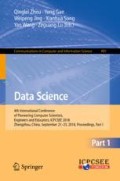Abstract
Everyday, millions of crowdsourcing tasks are accomplished in exchange for payments. Pricing acts as an important role in crowdsourcing campaigns, not only for the interest of requesters and workers, but also for the fair competition among the crowdsourcing markets, as well as its sustainable development. All the previous pricing strategies are based on the evaluation of results, however, in the scenario of crowdsourced android testing (CAT), the testing process of a worker is a factor that we cannot overlook. In this paper, we propose a unified model that combines Evaluation on both process and results of CAT (E-CAT). And based on the proposed E-CAT, we can construct the pricing strategy for CAT. On one hand, E-CAT enables the requesters to investigate the testing process of a worker from both aspects of depth and width. On the other hand, it helps the requesters evaluate the coming-outs of each worker.
Access this chapter
Tax calculation will be finalised at checkout
Purchases are for personal use only
References
Azim, T., Neamtiu, I.: Targeted and depth-first exploration for systematic testing of android apps. In: Acm Sigplan Notices, vol. 48, pp. 641–660. ACM (2013)
Bibi, S., Tsoumakas, G., Stamelos, I., Vlahavas, I.P.: Software defect prediction using regression via classification. In: AICCSA, pp. 330–336 (2006)
Callison-Burch, C.: Fast, cheap, and creative: evaluating translation quality using amazon’s mechanical turk. In: Proceedings of the 2009 Conference on Empirical Methods in Natural Language Processing, vol.1, pp. 286–295. Association for Computational Linguistics (2009)
Chin, E., Felt, A.P., Greenwood, K., Wagner, D.: Analyzing inter-application communication in android. In: Proceedings of the 9th International Conference on Mobile Systems, Applications, and Services, pp. 239–252. ACM (2011)
Dekel, O., Shamir, O.: Vox populi: collecting high-quality labels from a crowd. In: COLT (2009)
Durbin, R., Eddy, S.R., Krogh, A., Mitchison, G.: Biological sequence analysis: probabilistic models of proteins and nucleic acids. Cambridge University Press, Cambridge (1998)
Ipeirotis, P.G., Provost, F., Wang, J.: Quality management on amazon mechanical turk. In: Proceedings of the ACM SIGKDD Workshop on Human Computation, pp. 64–67. ACM (2010)
Kamps, J., Geva, S., Peters, C., Sakai, T., Trotman, A., Voorhees, E.: Report on the SIGIR 2009 workshop on the future of IR evaluation. In: ACM SIGIR Forum, vol. 43, pp. 13–23. ACM (2009)
Kazai, G., Milic-Frayling, N.: On the evaluation of the quality of relevance assessments collected through crowdsourcing. In: SIGIR 2009 Workshop on the Future of IR Evaluation. vol. 21 (2009)
Le, J., Edmonds, A., Hester, V., Biewald, L.: Ensuring quality in crowdsourced search relevance evaluation: the effects of training question distribution. In: SIGIR 2010 workshop on crowdsourcing for search evaluation, vol. 2126 (2010)
Mahmood, R., Mirzaei, N., Malek, S.: Evodroid: Segmented evolutionary testing of android apps. In: Proceedings of the 22nd ACM SIGSOFT International Symposium on Foundations of Software Engineering, pp. 599–609. ACM (2014)
Needleman, S.B., Wunsch, C.D.: A general method applicable to the search for similarities in the amino acid sequence of two proteins. J. Mol. Biol. 48(3), 443–453 (1970)
Rzeszotarski, J.M., Kittur, A.: Instrumenting the crowd: using implicit behavioral measures to predict task performance. In: Proceedings of the 24th Annual ACM Symposium on User Interface Software and Technology, pp. 13–22. ACM (2011)
Shabtai, A., Fledel, Y., Kanonov, U., Elovici, Y., Dolev, S., Glezer, C.: Google android: a comprehensive security assessment. IEEE Secur. Priv. 2, 35–44 (2010)
Acknowledgment
This work is supported in part by the National Key Research and Development Program of China (2016YFC0800805), and the National Key Technology Research and Development Program of China (2015BAJ04B00).
Author information
Authors and Affiliations
Corresponding author
Editor information
Editors and Affiliations
Rights and permissions
Copyright information
© 2018 Springer Nature Singapore Pte Ltd.
About this paper
Cite this paper
Lian, H., Qin, Z., Song, H., He, T. (2018). E-CAT: Evaluating Crowdsourced Android Testing. In: Zhou, Q., Gan, Y., Jing, W., Song, X., Wang, Y., Lu, Z. (eds) Data Science. ICPCSEE 2018. Communications in Computer and Information Science, vol 901. Springer, Singapore. https://doi.org/10.1007/978-981-13-2203-7_39
Download citation
DOI: https://doi.org/10.1007/978-981-13-2203-7_39
Published:
Publisher Name: Springer, Singapore
Print ISBN: 978-981-13-2202-0
Online ISBN: 978-981-13-2203-7
eBook Packages: Computer ScienceComputer Science (R0)

